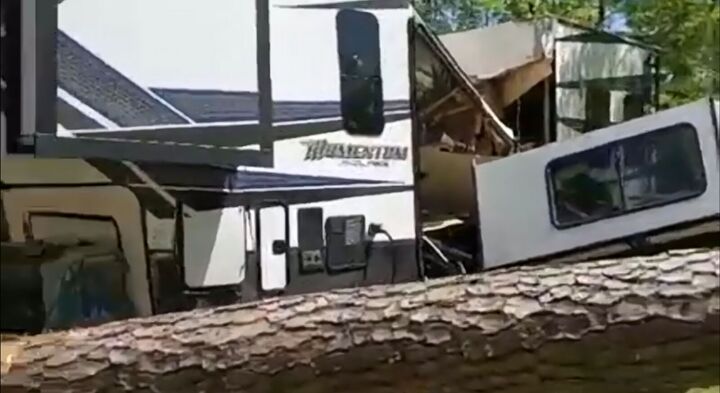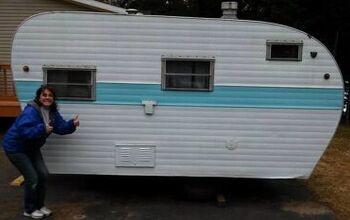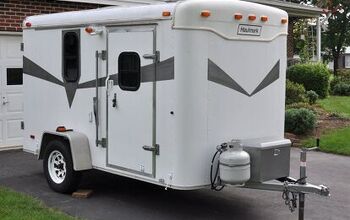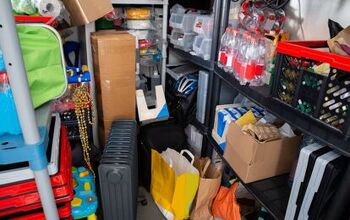RV Tornado Safety: What to Do in an RV When a Tornado is Coming

We want to share our experience with a weather event and RV tornado safety, as well as our friend Kali's, whose rig was destroyed by a tornado.
We recently went through a pretty scary event, and you can learn from it, too, because we didn't know how to handle it. We are in an RV full-time and had to deal with a possible tornado headed our way.
Kali's tornado experience
Kali and her husband had the experience of having their home destroyed by a tornado in Mississippi on Easter Sunday of 2020. One of the things that Kali would highly advise is that if you are in an area with tornadoes, watch to keep an eye out on the radar and watch the local news.
Before that happened, she had a gut feeling that she needed to get some bags and essentials together. She had put together some snacks, entertainment for their son, and some baby essentials. She also felt she needed to wear shoes and get a rain jacket.
Her father-in-law gave them a call and said that they needed to go. Right as they were packing up their truck and getting the kids into the car, they got a tornado warning. They got out of there.
A tornado watch is when the conditions are right for a tornado, and a tornado warning is when one has popped up on the radar. It's in the area, and you need to take shelter immediately.
They got out of the campground about five minutes before that tornado came through. They didn't even get hit directly by the tornado. It was the winds on the outskirts of it that got their rigs.
RV safety and shelters
RVs don't fare very well in tornadoes or hurricanes. So what should you do when you first arrive at your campground or park? Scope out the area, and see where there is a good shelter. I would add that to your check-in procedure.
When you arrive at an RV park or campground, ask, do they have a designated shelter area? If not, what do they recommend? Sometimes there'll be a concrete laundry room or restroom, which would be the ideal place to shelter.
Emergency kit
When you do have a shelter to go to, and you're evacuating your RV, you want to remember to bring a few things with you.
Basically, your wallet, your purse, and if you've got an emergency kit, which we recommend, you should have a flashlight, some non-perishable food, water, and a few other essentials. It needs to be quick.
Some people keep a little emergency escape kit beside their door, ready to go whenever they need to evacuate quickly. I think that's a pretty good idea.
Sheltering in an RV
Sometimes you don't have time to plan your escape, but if you do, you can prepare your RV. It might be a good idea to bring in your awnings. Bring in your slides if you can disconnect from the power and shut off your propane. That's only if you have time.
Often, there is only a few minute's warning, and you must immediately get to the shelter. Your life is number one.
If you find out about the storm at the last minute and need to take shelter and stay in the RV, you can do a few things to be on the safer side. Your safest place to be is probably still your bathroom. It's the smallest room in the RV.
You want to close your shades and stay away from the windows. You can also use blankets or pillows to cover up because there can be debris floating around all over the place from the wind, and that's where people get injured the most.
Preparedness on the road
When you're on the road, always keep an eye on the forecast of where you're traveling. If there's traumatic weather in your area, don't think you can outrun the storm. If you are on the road, don't shelter in an underpass. Those can turn into a wind tunnel.
You want to get off the road but stay away from trees. If you can pull up next to the side of a hill or a sturdy structure or wall, that would give you a little bit of shelter from the wind and put your jacks down. If you've got time, that will give you more stability, so you don't get flipped.
Let someone know outside of the storm area, family, friends, what's going on, where you can be located in case anything happens, and they can send the authorities to make sure you're safe if they don't hear from you.
Sometimes, weather advisories and emergency alerts will happen on your phone, so you need to make sure you have it enabled.
Also, it would be best to have a weather radio that winds up.
In addition, for your phone, go to your notifications, scroll down to the bottom, and see Amber, emergency, and public safety alerts. You can turn them on or off, depending on your preferences.
Dust storm
We experienced being caught in a dust storm when traveling. We were turned into the wind, which is a recommendation if you are on the road and it's a windstorm, and you can see the direction it's coming from; you want to turn into the wind when you park because you don't want that hitting you sideways.
Your RV is aerodynamically designed to take the wind head-on as you go 60 and 70 mph down the freeway.
If you have time when you're parked, put down your stabilizers in that situation as well. That was a scary storm. I was scared because it was unexpected. I'm happy we weren't on the road, and that hit us when we were driving.
RV tornado safety
Bad weather can happen anywhere and be worse if you're in an RV. Knowing RV tornado safety can be a literal lifesaver. What tips would you add on handling emergency preparedness in an RV? Let us know in the comments.






















Comments
Join the conversation
Thanks, I travel cross country in an LQ 3 horse trailer and am always on the lookout for tornadoes. This was helpful info.
Taking a supply of medications, if you use any.